- Home
- Michael Northrop
Polaris Page 14
Polaris Read online
Page 14
“It would be suicide,” said Thacher. “It is a lightless hole, cramped and crammed with every manner of obstacle and impediment. And now it will be flooded, the cargo toppled over, everything in disarray. It would be dangerous, honestly, even without a monster.”
The assembled crew stood looking at the wooden hatch. No one questioned Thacher’s assessment. The hold had been his domain once. Now it belonged to the beast.
Images played out in Owen’s head. They had drawn the creature out into the open. They had sprung their trap. Their plan had worked.
And yet the monster still lived.
Now it would complete its transformation in darkness.
As the crew mulled over its failure for the next few days, the weather seemed to be trying to lift their spirits. The skies were blue, and there was a steady wind out of the southeast. But no amount of tropical sunshine could brighten their moods now. Their thoughts had turned stormy, and their prospects for survival had turned dark.
They did what they could to improve their situation. They boarded up the hatches again. They fortified the door to the cabin, in case they needed one last refuge to retreat to.
“It won’t matter, you know,” Henry had said as he held out another nail for Owen to hammer in. “Once the creature is at full strength—with six barbed legs, each as strong as a kicking mule—it will tear through this wood like a sparrow flying through a spiderweb. It is only a matter of time—and not much of it either.”
Owen mumbled, “It might matter,” and then promptly smashed his thumb with the hammer.
As the sun rose and fell and the shadows stretched and retreated, the crew jumped at every sudden sound. On a ship whose wood and steel constantly groaned and thumped, their nerves stretched thinner and thinner. And the hardships didn’t end there. They cut their rations in half, by more or less general agreement. The food they had would have to last now—unless maybe they could pull some from the sea. And at the first hint of rain, every bucket and pan they had was set up to catch the fresh water.
Now they were hungry as well as sore. The enormous task of sailing the ship alone was made harder still by grumbling stomachs and a lack of energy. The little cleaning and maintenance they’d kept up with was abandoned. If they ever did get the Polaris into port, she wouldn’t be a pretty sight.
Neither would her crew. A quick rain shower swept across the sea on the third day after the failed hunt. The crew scrambled to collect the water, but not one of them made a move to grab a bit of soap for a long-overdue cleaning. Their hair grew matted and clumped. Their faces were streaked and greasy. And their clothes, which had been grimy for some time already, descended into indecency.
“What is that smell?” asked Aaron during a brief lull in the wind.
Thacher looked up from where he sat, sharpening his hatchet. “It is us,” he said, waving the blade around in a menacing circle. “It is all of us.”
The wind had picked up again after that, mercifully scattering the odor. But the wind gained strength and its mercy was short-lived. Soon the ragged crew had to scramble up into the rigging to take in more sail before something else on the neglected ship broke or tore.
Once again, Henry had barely reached the top by the time the others were descending to the next sail. Owen balanced against the forward topsail yard, grabbing canvas by the fistful and considering the frail boy. It wasn’t a lack of experience at this point; it was a lack of aptitude. Henry simply would never be an accomplished sailor. What bothered Owen most about it was knowing that, apart from some wounded pride, Henry didn’t care one bit. Owen saw the way the other boy’s eyes searched the horizon for land. He wanted nothing more than to be back on solid ground, likely for the rest of his life.
Owen longed to reach port too, of course. That was the only path to survival. But the sea, and this ship, was his home. His uncle had taken him in after his mother’s death and his father’s descent into sorrow—and the bottle. The Polaris had given him a place and a purpose.
He would return to shore but not to stay. He looked forward to reaching safe harbor for a time: There would be men and guns there—the army, perhaps. Whatever it took to wipe their foul cargo from the face of the earth. And afterward, there would be a heap of strong lye soap to scrub its memory from the sturdy old wood of the Polaris.
Who would take over the ship then? Who could say? But Owen felt sure his family would have some say in the matter. And whoever it was, surely they would need a steady cabin boy who knew the boat inside and out.
So, yes, he would bring the Polaris into port, but it had to be a safe one. It had to be in the United States, where the laws of property and inheritance would be respected and upheld.
Unfortunately, even with kind winds, the U.S. was still far beyond the horizon. They were still sailing across the blue waters of the Caribbean Sea, and not everyone shared his conviction to see the journey through. The talk had started up again as soon as they had returned from their ill-fated trip between decks.
“We must steer for the nearest port,” said Thacher. “Those who meet us may not be of our nationality, but at least they will be of our species.”
And he was far from alone in that position. In fact, as the days wore on, it was Owen who was beginning to feel more and more isolated.
The idea of organized watches fell by the wayside. The pumping took up more and more time, and still the ship rode lower and lower in the water. There was simply too much work to do and too few of them to do it.
No one worked harder than Owen, but having been on deck for much of the night and all of the day, he pulled the captain’s spare pocket watch from his trousers and noted the passing of another four hours. His watch was at least technically over. With the sails in good shape and no need to adjust sheet or stay, he finally slunk back into the cabin for a few hours of sleep. He took one last look over at the helm. Can I trust the others to stay the course? He yawned. He would have to.
The light was dim as he entered and the air was thick with the smell of his crew mates, even though none of them were currently there. He wanted nothing more than to stumble over to his hammock and let the sea rock him to sleep, but he forced himself over to the desk first. He wanted to double-check their heading one more time. They could not afford to waste time correcting their route later.
He turned up the lantern above the desk and took a seat. As soon as he was off his feet, his body seemed to collapse. His eyes drifted closed; his head drooped down …
Owen snapped back awake. He forced his eyes to open wide and shook his sleep-fogged head. Check the course first, he told himself. Then sleep.
He had to dig hard into his memory for the observations he’d taken on deck just a minute earlier. He reached for the map blindly as he looked over toward the big compass, floating level in its gimbal as the ship gently rose and fell.
His hand searched the desk for the map, but he didn’t feel it there. Strange. He let his hand hop around to either side.
“Ow!” he yelped, feeling a sharp jab in his palm. He turned his eyes from the compass and toward the desk. He had stabbed himself on a V-shaped device known as a divider.
“What is that doing there?” he mumbled to himself.
And then he saw the map, pushed halfway up the desktop and folded over in entirely the wrong way.
He sprang to his feet and raced toward the door, the fog of sleep burning off under the sudden searing heat of anger. Someone has been fooling with the navigation equipment! Owen fumed at the thought: He had forbidden it! They had all agreed!
Marks had been made on that map, pins and clips affixed at exactly the right spots—and not just by him but also by the captain himself! And those dividers had been opened to exactly the right width to check the next measurement against the last.
Three words burned in his brain as he barreled through the door: Who did this?
The door slammed hard against the wall and Owen took in the entire scene at a glance. Thacher was leaning in close to A
aron, just past the quarterdeck. At the sound of the door, they both wheeled around and looked straight at him. Their eyes were wide, but he didn’t think it was fear he saw there. It was something else. And when they both looked down, avoiding his angry gaze, he knew what.
Guilt.
They’d been caught talking behind his back. It was a common enough occurrence aboard a sailing ship, where gossip and slander abounded and no one was ever too far from anyone else.
He was sure they were talking about him. He headed straight toward them. Thacher’s eyes rose sheepishly, but they didn’t meet his. Instead, they lingered on the gun stuck in his belt.
“What is it?” said Maria from over at the wheel.
Her voice was innocent enough, without being too innocent, and he made up his mind then that she was not a part of it. He reached the edge of the little quarterdeck but did not descend the steps. Instead, he stood there, glaring down at the other two.
“Who’s been at the maps?” he snarled. “They’re a mess—a wreck! I think we’ve lost some of the markings!”
He stared daggers at them as he said it, trying to make them understand the seriousness of the situation. Navigation was a complex business, relying not just on compass readings and star sightings but also math and intuition. Owen had poured every bit of his brain into it and had nearly gone cross-eyed staring at the maps and charts. He had swum upstream against the wizardry of Bowditch’s Practical Navigator. And if he felt he had made some headway, if he had gained some small confidence that they were on the right course, it was just barely. And now to have his work upended? And for what?
“Where are the others?” he demanded, but a moment later he saw Emma aloft—of course—and Henry bungling Lord knows what task on the forecastle.
He turned his attention back to Thacher and Aaron, sure it was one of them. He spat out his next words like poisoned pellets: “Who. Did. This?”
Thacher finally looked up. He made glancing eye contact with Owen and broke into a small, maddening smile. “Perhaps it was Daffy?” he said.
“The ship’s cat?” sputtered Owen.
“Why not?” said Thacher. “She can’t go below to catch rats anymore. Maybe she got restless and made a mess of the desk?”
Owen glared at him. “Aye, maybe she did jump up there,” he said. “But tell me: When did she learn to use a divider?”
Thacher looked down. “She is an exceedingly clever cat,” he said to his own sun-browned bare feet.
Owen heard a soft chuckle from Aaron and felt his face growing hot and his pulse pounding in his ears.
“But tell me,” Thacher continued, “not having seen the maps, I don’t know for sure, but are we not nearing some large ports?”
Owen felt like his head was going to explode. “So that’s what this is about,” he muttered bitterly. Thacher had pored over the maps trying to find the nearest ports. The betrayal felt like a punch in the gut. Owen desperately wanted to leap down and throttle Thacher into unconsciousness—and then wake him up by tossing him overboard.
“Perhaps just a bit north of here?” added Aaron.
Owen glared at him, his eyes narrowed into slits. “You too, Aaron?”
“Me too, what?” said Aaron, his voice dripping with fake innocence.
Owen shook his head and looked up to the sky. It was useless. He saw the pale gray sails stretched tight with wind and Emma moving high up through the rigging like a spider. He could prove nothing—and who would he prove it to? There was no greater authority left. No captain to order them chained up below, no first mate to whip their backs raw.
There was just him—and he was so tired now. He felt his pounding pulse soften and the blood draining from his head. His shoulders slumped.
And what punishment could he possibly threaten that was greater than what they already faced? By hand or claw or sea, they would all be punished.
Punished for the deeds of others, punished for forces beyond their control. It didn’t seem fair. He looked at Thacher once more, sizing him up. He noticed that he was now wearing a hatchet in the same place that Owen himself wore his gun.
Punished for the deeds of others, he thought again. But maybe we will have committed some crimes of our own by then.
That night, Owen was standing at the wheel. The moon was nearly full and the sky was cloudless. The deck glowed silver all around him. He looked up at the sails, shimmering in all that moonlight. They’d be prettier with more wind in them, he thought. The wind had dropped off now, and the heavy ship was making slow progress through the night.
Once again, he tried to calculate how much longer the voyage would take. They were nearing Cuba now, if he had it figured correctly. He knew three things about the island: It was ruled by Spain, produced a tremendous amount of sugar cane, and was quite close to the tip of Florida. That was their target. If they’d had the time and crew, they would bring the ship back to the teeming ports of New York or Boston. But they had neither, so Florida would have to do.
He ran through what he knew of that place too. It was a U.S. territory now. Some said it would become a state soon, but others said that day was still a long way off. There had been trouble in Florida recently, fighting between the army and the native population. But there were ports there, with deep harbors. The closest was at Key West. If they could skirt the western edge of Cuba, they could turn east and head straight there.
His hands light on the wheel, his eyes drifted over to the aft hatch, still boarded up tight as a drum. They just needed a little more time. He looked up at the drooping sails. A little more time, and a little more wind …
A thought occurred to him. They could go back on full rations tomorrow. They were close enough, and he was reasonably sure there was enough food left. With the ship going so slowly, they had even managed to catch a few fat fish. Maybe more food would ease the tensions and quiet some of the conspiratorial whispering.
The only person he was sure was on his side was Henry. If Owen understood correctly, he wanted to bring the ship back to the United States out of some loyalty to his former employer. Owen wasn’t sure exactly why, but he was glad for the support. Though he was an abysmal sailor, Henry enjoyed a certain status among the crew as the leading authority on the creature lurking below.
But Thacher agitated constantly for heading to port and had moaned and groused at every one that passed by unseen, from Kingston on one side to Belize Town on the other. Aaron was quieter about it but had made his allegiance clear enough. Maria had too, though he could hardly blame her for that. She was in constant pain now because of her infected foot and welcomed the thought of a doctor of any nationality.
Emma had yet to declare her loyalty. He hoped that she backed him and was simply staying silent to avoid an argument with her sister. He thought Emma trusted him, maybe even admired him a little … He pictured her now, climbing nimbly up the shrouds.
Owen tugged hard on the wheel, as if it were the ship that had wandered off course and not his thoughts.
Focus, he told himself. It is the others I need to convince. Even if Emma was on his side, it would still be three for and three against. If she wasn’t, the numbers would be against him. Regardless, he knew there would be tremendous pressure to make landfall in Cuba once they sighted it. He’d have to make sure he was at the wheel then. Or Henry—but then they might crash into shore anyway.
And maybe it was the thought of land so close, passing just off the starboard bow. Or maybe it was the realization that most of the others disagreed with the course he’d set. Whatever the case, a troubling new thought sprang to mind. It was simple enough but utterly explosive to him. Four words that he had very rarely entertained before: What if I’m wrong?
The thought was new to him, but the image they brought to mind was quite familiar. He whispered a name into the night air. It was the name of an old sailor. It was the name, he now realized, of the first victim of the strange contagion that the Polaris now carried in its hold.
“Wrick
itts.”
He remembered the changes that had come over him: the shambling gait, like the creature’s, the “perfume” smell, the grotesque rash. He shuddered to think where those changes would have led had they been left to run their course. He remembered the mutineers’ words through the door: “Look at him!” And then a gunshot and the shouted order to pitch his ravaged body overboard.
They’d wanted to rid the ship of him—and to rid the world of the ship. They were the villains who had killed his beloved captain.
But what if they were right?
Henry lay awake for most of the night. He was sure he heard something moving just below the cabin. The wind had picked up again, and he strained to isolate the sound from the gentle hush-hush of the ship rolling through the water and the not-so-gentle snoring of Aaron in the next hammock. There! He heard it again. Was it a scratch? A thump? It’s both, he decided, and went back to listening. His heart hammered in his chest. It was coming from directly below them. Was it a coincidence, or could the creature sense their presence through the worn old wood?
You don’t even know if it is the creature, he told himself. Calm down. Be reasonable.
But it didn’t work. He was sure it was the creature—he could practically see its barbed feet dragging across the wet wood below. How deep is the water between decks now? And when will the creature tire of its dreary confinement there?
He went back to listening but only heard the noise once more that night. And he was so sleepy that he wondered if he’d dreamed it. Because the noise had changed. It almost sounded like the scratching was coming from within the floor, not below it.
Finally he drifted off to sleep. Almost immediately he was woken up to take his turn at the pumps. He groaned and headed out along with Aaron. The chain pump worked better with four people but the job could be done with two. Henry’s muscles still ached from the day before. His muscles always seemed to ache these days. Look on the bright side, he told himself. At least you have muscles now.

 On Thin Ice
On Thin Ice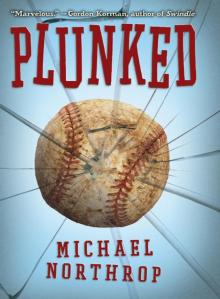 Plunked
Plunked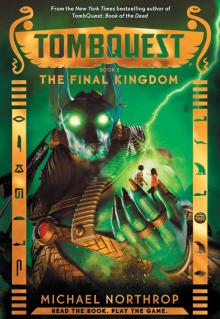 The Final Kingdom
The Final Kingdom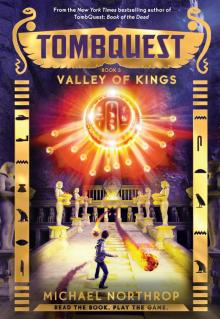 Valley of Kings
Valley of Kings Surrounded by Sharks
Surrounded by Sharks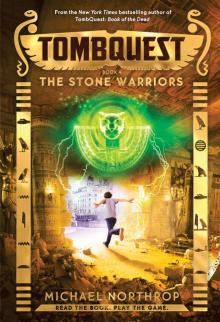 The Stone Warriors
The Stone Warriors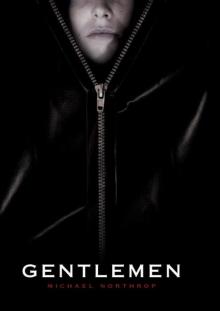 Gentlemen
Gentlemen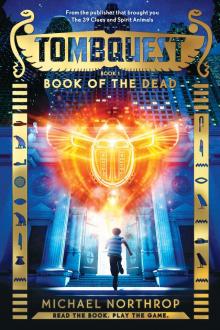 Book of the Dead
Book of the Dead Polaris
Polaris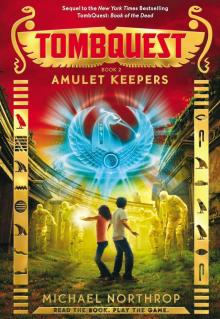 Amulet Keepers
Amulet Keepers